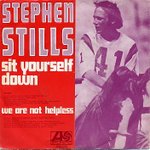
Carla Venita Thomas is an American singer, who is often referred to as the Queen of Memphis Soul. Thomas is best known for her 1960s recordings for Atlantic and Stax including the hits "Gee Whiz " (1960), "B-A-B-Y" (1966) and "Tramp" (1967), a duet with Otis Redding. She is the daughter of Rufus Thomas.

"Back in My Arms Again" is a 1965 song recorded by The Supremes for the Motown label.
Genya Ravan, a.k.a. Goldie is an American rock singer and music producer. She was lead singer of The Escorts, Goldie and the Gingerbreads, and Ten Wheel Drive.

CSN is the fifth album by Crosby, Stills & Nash, released on Atlantic Records on June 17, 1977. It is the group's second studio release in the trio configuration. It peaked at No. 2 on the Billboard Top Pop Albums chart; two singles taken from the album, Nash's "Just a Song Before I Go" and Stills' "Fair Game" charted on the Billboard Hot 100. It is currently the trio configuration's best selling record, outselling 1969's Crosby, Stills & Nash by 200,000 copies. It has been certified quadruple platinum by RIAA.
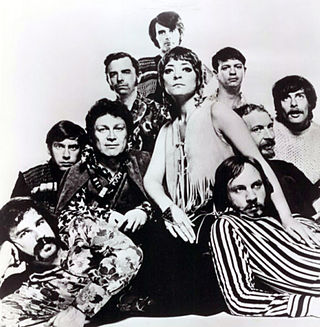
Ten Wheel Drive was an American rock band which existed from 1968 to 1974.

Stephen Stills is the debut solo album by American musician Stephen Stills released on Atlantic Records in 1970. It is one of four high-profile albums released by each member of Crosby, Stills, Nash & Young in the wake of their 1970 chart-topping album Déjà Vu, along with After the Gold Rush, If I Could Only Remember My Name and Songs for Beginners. It was primarily recorded between CSNY tours in London and Los Angeles. It was released in the United States on November 16, 1970, and in the United Kingdom on November 27, 1970.
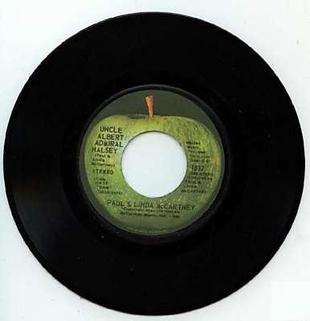
"Uncle Albert/Admiral Halsey" is a song by Paul and Linda McCartney from the album Ram. Released in the United States as a single on 2 August 1971, it reached number one on the Billboard Hot 100 on 4 September 1971, making it the first of a string of post-Beatles, Paul McCartney-penned singles to top the US pop chart during the 1970s and 1980s. Billboard ranked the song as number 22 on its Top Pop Singles of 1971 year-end chart. It became McCartney's first gold record after the breakup of the Beatles.

Songs for Beginners is the debut solo studio album by English singer-songwriter Graham Nash. Released in May 1971, it was one of four high-profile albums released by each member of Crosby, Stills, Nash & Young in the wake of their chart-topping Déjà Vu album of 1970, along with After the Gold Rush, Stephen Stills and If I Could Only Remember My Name. Songs for Beginners peaked at No. 15 on the Billboard Top Pop Albums chart, and the single "Chicago" made it to No. 35 on the Billboard Hot 100. It has been certified a gold record by the RIAA.
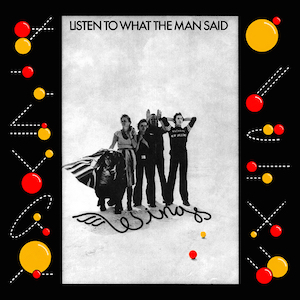
"Listen to What the Man Said" is a hit single from Wings' 1975 album Venus and Mars. The song featured new member Joe English on drums, with guest musicians Dave Mason on guitar and Tom Scott on soprano saxophone. It was a number 1 single on the Billboard Hot 100 chart in the US and reached number 1 in Canada on the RPM National Top Singles Chart. It also reached number 6 in the UK, and reached the top ten in Norway and New Zealand and the top twenty in the Netherlands. The single was certified Gold by the Recording Industry Association of America for sales of over one million copies.

"Letting Go" is a song credited to Paul and Linda McCartney and originally released by Wings on their 1975 album Venus and Mars. The song was remixed and released as a single on 4 October 1975 in the United States, and on 18 October 1975 in the United Kingdom. The song peaked at number 41 in the UK and number 39 in the US.

Down the Road is the second and last studio album by Stephen Stills' band Manassas. It was released in April 1973, and peaked at number 26 in the US charts, to mixed reviews. "Isn't It About Time", a protest song, was released as the lead single and reached number 56 on the charts.

"Goodbye Stranger" is a song by the English rock band Supertramp; it was written by Rick Davies. The song first appeared on their sixth studio album, Breakfast in America (1979). The lyrics present an "optimistic view from a drifter."

"Love the One You're With" is a song by American folk rock musician Stephen Stills. It was released as the lead single from his debut self-titled studio album in November 1970. The song, inspired by a remark Stills heard from musician Billy Preston, became his biggest hit single, peaking at No. 14 on the Billboard Hot 100 in early 1971. David Crosby and Graham Nash, Stills' fellow members of Crosby, Stills & Nash, provide background vocals on the song. The song was also recorded by other pop musicians, notably the Isley Brothers, The Meters, Bucks Fizz, Luther Vandross, Bob Seger and Richard Clapton.
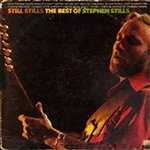
Still Stills: The Best of Stephen Stills is a compilation album of Stephen Stills, released on December 2, 1976 on Atlantic Records. Made up of songs from his first four Atlantic albums, including the two Manassas albums, it peaked at number 127 on the US charts, and increased Stills critical standing slightly. It was assembled without input from Stills himself, and is currently out of print.

4 Way Street is the third album by Crosby, Stills & Nash, their second as Crosby, Stills, Nash & Young, and their first live album. It was originally released as Atlantic Records SD-2-902, shipping as a gold record and peaking at No. 1 on the Billboard 200. A document of their tour from the previous year, the live recordings presented were taken from shows at the Fillmore East on June 2 through June 7, 1970; The Forum on June 26 through June 28, 1970; and the Auditorium Theatre on July 5, 1970.
"Feel the Need in Me" is a song written by Abrim Tilmon, a member of the American R&B/soul vocal group the Detroit Emeralds. It was released as a single by the group in October 1972 on the Westbound label. It reached number 4 on the UK Singles Chart, number 22 on the R&B chart, and number 110 on the Billboard pop chart. The song was featured on their 1972 album You Want It, You Got It.

“So Far Away” is a song written by Carole King, which appeared on her 1971 album Tapestry. The recording features James Taylor on acoustic guitar.
"Sit Down, I Think I Love You" is a 1966 song composed by American singer-songwriter Stephen Stills and originally recorded by American-Canadian rock band Buffalo Springfield. A cover version by The Mojo Men was released as a single in 1967 and reached the U.S. Top 40. Also that year, Australian band The Executives charted in their home country with their version of the song.
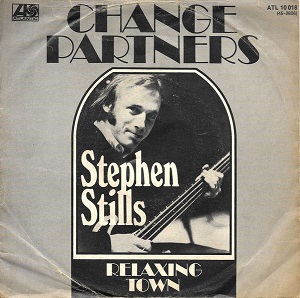
"Change Partners" is a song written by Stephen Stills that was released on his 1971 album Stephen Stills 2. It was also released as the debut single from the album, just missing the Top 40, and peaking at number 43 on the Billboard Charts, during the week of July 24, 1971 and spending 9 weeks on the chart.
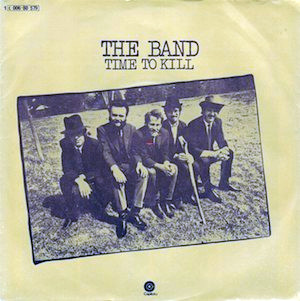
"Time to Kill" is a song written by Robbie Robertson that was first released by the Band on their 1970 album Stage Fright. It was also released as a single off the album, backed with the more famous "The Shape I'm In" and, although it failed to reach the Top 40 in the United States, it peaked at #13 in the Netherlands. It has also been featured on several Band compilation and live albums.
